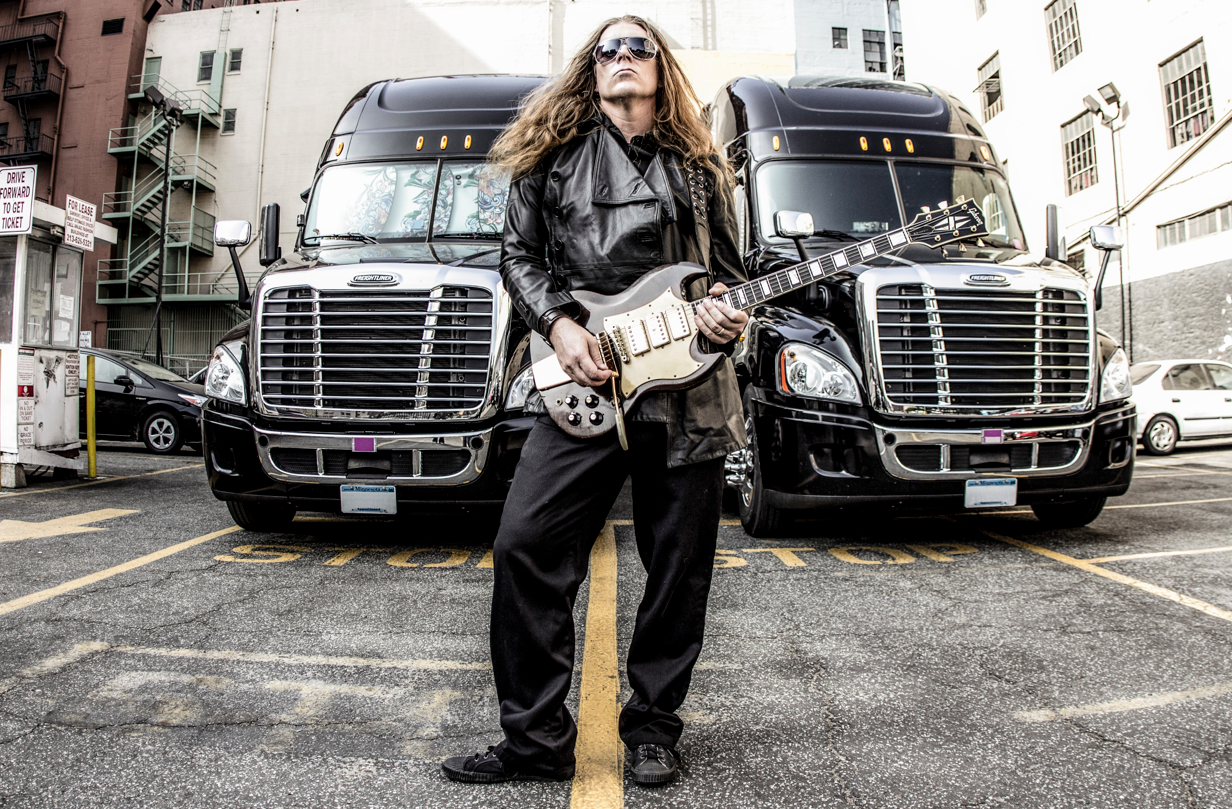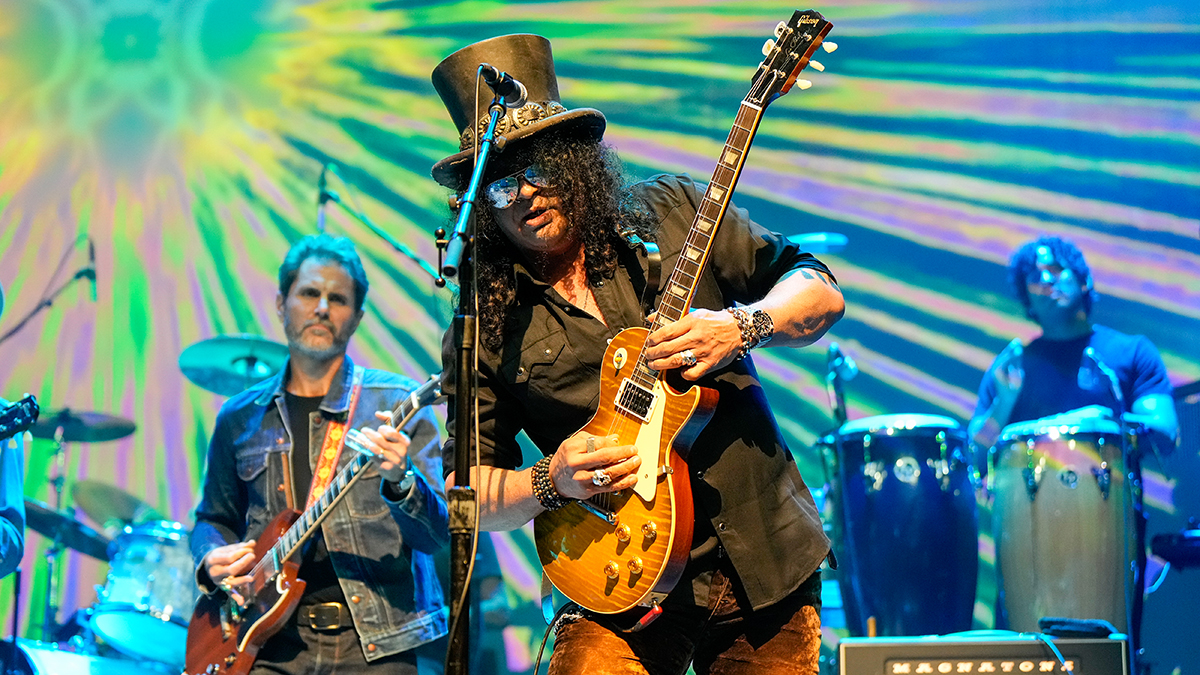Former Racer X Guitarist Bruce Bouillet Talks New Album, 'The Order Of Control'

Bruce Bouillet might've taken an eight-year hiatus from playing due to a serious hand injury, but the former Racer X guitarist is back, fired up and more active than ever.
We recently spoke to Bouillet, a fixture of the Los Angeles studio scene, about his new instrumental album, The Order Of Control, which was released January 21 via Mascot Label Group’s Music Theories imprint.
GUITAR WORLD: What was the first music that really excited you? What players made you sit up and take notice?
The first music I got turned on to was AC/DC, the Clash and Devo. But when I heard Black Sabbath, I knew I had arrived. As far as what players excited me back then, it would have been Eddie Van Halen, Randy Rhoads, Ritchie Blackmore, Michael Schenker, Tony Iommi and George Lynch.
I ended up at camp Shrapnel at a very young age with Racer X, which exposed me to a lot of new players that were very advanced. After that I was really impressed with a lot of the newer bands of the time like Rage Against the Machine, Metallica and so on. I also discovered some of the more underground sounds like Fugazi, Barkmarket and King Crimson. I still look for a lot of new music. Recently it's everything from Steven Wilson and Animals As Leaders to Lightning Bolt.
Describe your relationship with your fans. How has it evolved over the years?
The fans are awesome. The Shrapnel thing seems to have a cult-like following throughout the guitar community around the world. I get a steady stream of people from all ages sending me videos of them or their band playing "Scarified."
All the latest guitar news, interviews, lessons, reviews, deals and more, direct to your inbox!
A good example of how it's changed or evolved would be the 2007 G3 tour when I was playing with Paul Gilbert. After the show, I ran into an older couple who said they thought they'd never get to see me and Paul play together. Then I walked to the tour bus and there was a group of kids ages 12 to 14 who had some Racer X albums they wanted signed. So if anything it just spans a wider time frame.
Have you ever been surprised by some of the people who love Racer X? Any movie stars or politicians?
Yes, it's funny just how far-reaching music and guitar playing can be. I've had musicians in successful bands, brain surgeons, actors, actresses, politicians, military, scientists, professors, artists ... all the way to someone behind the bar in Japan serving drinks or driving a cab in London. There are a lot of guitar players in this world. I've been pulled over driving expecting a ticket and ended up discussing the live solo on Extreme Vol. 1 instead [laughs].
Let's talk about your musical journey. How would you describe your path from the start through now with your new album, The Order Of Control?
I took about an eight-year hiatus from guitar due to a hand injury. In that time, I stayed in the music business and produced and recorded. Around 2005 after producing a Grammy winner for Motorhead, I started to play again and was able to get back to full strength. I released a couple of instrumental albums, which were on the lo-fi demo side. On this new record, aside from it being a full concept album with sequels, I really wanted to approach it like a big-budget album, meaning cutting drums in a real studio, having an SSL mix room with a pro mixer, using top musicians such as Glen Sobel from Alice Cooper on drums and Dave Foreman on bass.
It was a bit more challenging money-wise, but the results speak clearly. I also spent a lot of extra time working on the writing. Instrumental albums can be challenging at times due to the lack of lyrics, so one must be able to set a mood and hold your attention with the melodies, structures, dynamics and arranging of various instruments, as well as some over-the-top playing.
Your band is also called the Order of Control, correct? Who's in the band and how did you come together?
Yes, the album and the band are called The Order Of Control. The first few albums are instrumental and then the vocals will kick in. So really I'm the band with various other musicians contributing their parts for now. But when it turns to the vocal side, it will take on more of a full-band vibe. I'll be looking at someone to front the project in the upcoming months, but what is already written is the sickest stuff I've ever tracked.
As far as who played on the album, Glen Sobel (Alice Cooper, Orianthi) does the drums and my friend Dave Foreman (Dj Quick, Boyz to Men, Rhianna) does bass. I've known Dave for years. We've written hundreds of songs for TV. If you are in the U.S. and watch any sports such as the NFL, NHL, MLB, NASCAR, etc., you've heard our stuff. Dave is very inspiring to work with, and I've learned countless things from him, a lot to do with being naturally musical.
Glen Sobel and I met when he subbed for a sick Danny Carey (Tool) at a VOLTO concert in Studio City at the Baked Potato. What he brought to the table was some really great chops and drum lines, as well being able to cut the whole album in two days! A real pro!
I know how great your chops are. But you have riffs and melodies for days on this album. What was the mindset going into the sessions? Was melody a huge focal point? And what advice would you have for guitarists who want to play more melodically?
Thanks for the kind words. I really like high-level playing, be it speed, note choice, effects or whatever. It's all been a part of my musical journey. But the final frontier to me is in the writing, innovating and having your own voice. Do I still play some tricky things on this album ? Yes, because the songs called for it — not because I wanted everyone to hear me string-skip 32nd notes.
Probably one reason instrumental albums can be a hard sell is they can turn into a vehicle for players to just show off their chops, a lot of which can turn very boring, very quickly. My goal was to maintain a high level of playing while making each song, and the album as a whole, something you'd want to listen to.
If you want to play melodically, learn your triads. Be able to outline chords anywhere on the neck with just chord tones. This is your foundation. Most players tend to skip this part. I did for many years, because I wanted to play flashier stuff. A good test for this is to pick a chord progression; let's say D minor, C major, G major. Record yourself playing those chords in time. Now record yourself playing over those chords in time.
Sounds good, right? Now record yourself soloing in time without the chords. Can you still hear the chords changing within your solo? This is a fundamental part of music. If you can't hear the chords changing during your solo, go back and learn the chord tones. It will change your life melodically.
What do you want people to know about you and your music?
The new album is out on Music Theories Recordings (Mascot Record Group), the coolest label I've ever been a part of. I'm just getting started, with full tours in the works, as well as new albums already written and future productions that incorporate 3D projection mapping and other visuals live. If you need to reach me for shows or private instructions, or if you feel you know someone with a unique voice, e-mail me at skypeguitar1000@gmail.com.
Also, I love to interact on my pages:
•brucebouillet.com
•Facebook
•Twitter
Dave Reffett is a Berklee College of Music graduate and has worked with some of the best players in rock and metal. He is an instructor at (and the head of) the Hard Rock and Heavy Metal department at The Real School of Music in the metro Boston area. He also is a master clinician and a highly-in-demand private guitar teacher. He teaches lessons in person and worldwide via Skype. As an artist and performer, he is working on some soon-to-be revealed high-profile projects with A-list players in rock and metal. In 2009, he formed the musical project Shredding The Envelope and released the critically acclaimed album The Call Of The Flames. Dave also is an official artist endorsee for companies like Seymour Duncan, Gibson, Eminence and Esoterik Guitars, which in 2011 released a Dave Reffett signature model guitar, the DR-1. Dave has worked in the past at Sanctuary Records and Virgin Records, where he promoting acts like The Rolling Stones, Janet Jackson, Korn and Meat Loaf.
